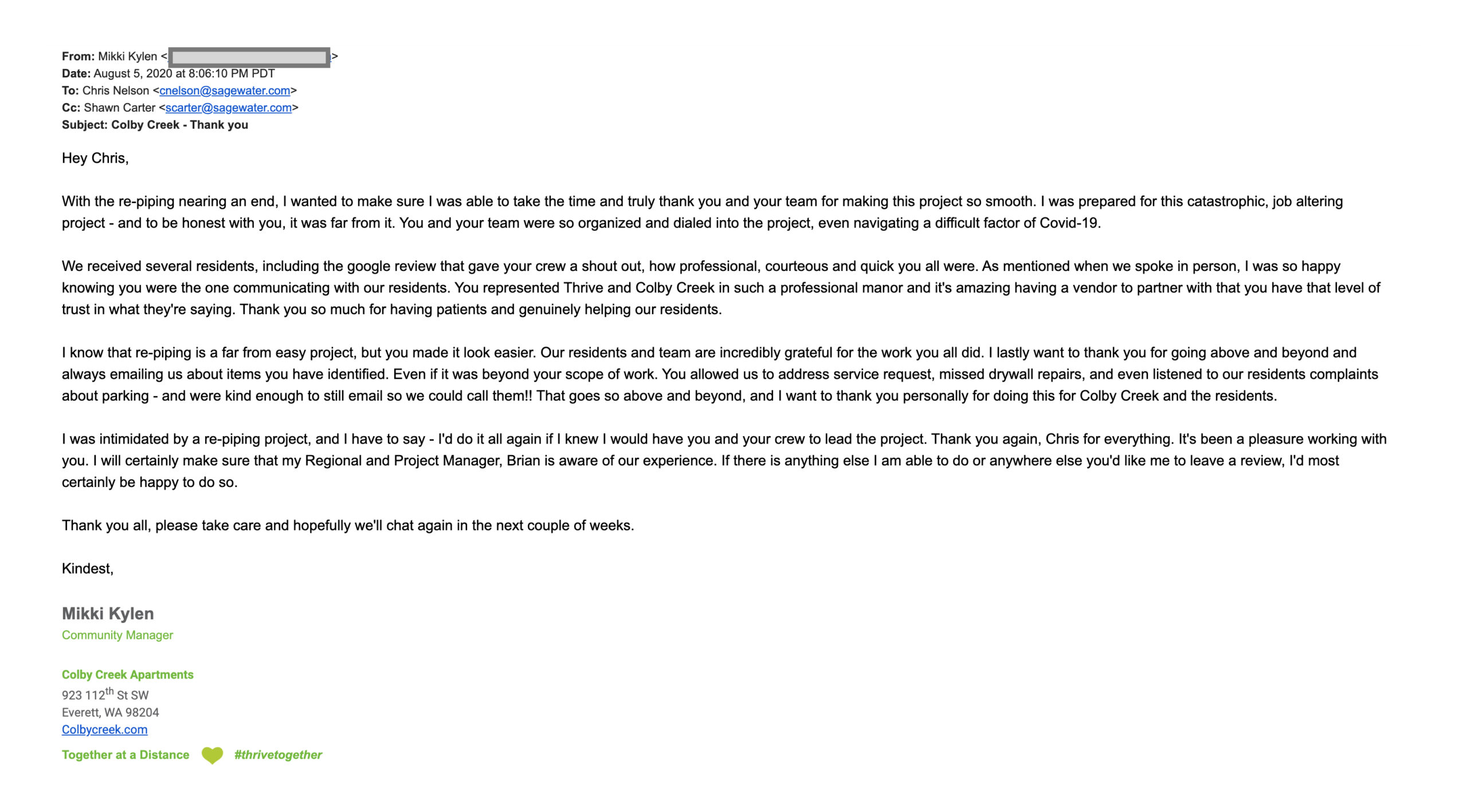
COVID-19 FAQ
SageWater is committed to continuing business operations while working diligently to comply with CDC and WHO best practices, as well as Federal, State and Local guidance and executive orders regarding safety and social distancing. We are grateful that our particular construction trades (plumbing, carpentry and painting) are some of the lowest-risk categories for exposure to the virus. That said, we continue to monitor the situation closely and adjust our response as necessary to best address these unique circumstances.
The following FAQ is offered to help property managers, Boards of Directors, and residents know the actions we are taking to mitigate the risks and enhance protection of their community while continuing to work hard to repair the failing piping systems.
What protective equipment is SageWater using at the jobsite to help prevent the spread of the virus?
All employees in the field, including Project Managers, are required to wear a protective face mask at all times while on the job site; this is to help mitigate the potential of an employee being asymptomatic and coughing, sneezing, or otherwise contaminating their surrounding environment unintentionally and helps minimize the potential passing of the virus from unit to unit or to other employees or residents.
All employees are required to follow local jurisdictional guidelines for wearing masks and social distancing, minimizing their exposure to the virus by being conscientious of their surroundings and social situations, and removing themselves from large gatherings and other social situations that have not been sanctioned by the local authorities.
Is SageWater checking employees for sickness?
Upon arrival every morning, all employees will be required to undergo a non-invasive health screening prior to entering a SageWater job site, per the advice of our medical consultant; this screening consists of a visual inspection by a manager and a temperature reading using a contact-free infrared thermometer or a Crystaline ST Indicator (an adhesive strip medical-grade thermometer); any employees who appear sick, have reported symptoms suggestive of COVID-19, or whose temperature reads higher than 100.4 degrees F, will not be permitted to work and will be referred for medical care before being cleared to return.
Strict protocols have been developed when an employee is sick, thinks they have been exposed, or tests positive for COVID-19. This includes testing, quarantining at home, being symptom free, and testing negative before being allowed to return to work. Any positive COVID-19 test results will be reported to the appropriate health and labor agencies as required by local, state, and federal statute.
What are SageWater’s protocols if an employee tests positive for COVID-19?
SageWater has developed a COVID-19 Exposure Prevention, Preparedness, and Response Plan that governs our course of action when an employee reports a positive COVID-19 test result. Any employee who tests positive will be required to self-quarantine until medically cleared to return to work. Vehicles, tools and work spaces that the employee may have used in the previous 48 hours will be sanitized per CDC guidelines. SageWater will notify employees, subcontractors, vendors or clients who may have been in close contact with the infected individual, and will alert state and local authorities within 24 hours of the positive test result so that contact tracing efforts can begin; employees identified as close contacts will be required to self-quarantine and will not be permitted to return to work until they have been tested for COVID-19 and received a negative result.
What is SageWater doing about their subcontractors?
Fortunately, we use very few subcontractors, and typically when we do, it’s for hazardous materials abatement (like asbestos), meaning they are already well equipped with the personal protective equipment required to safely perform their job functions. That being said, we are asking all our subcontractors to follow the same protocols as our employees, including wearing masks as well as submitting to a health screen and temperature check every morning before entering the job site.
How is SageWater managing its employees after-hours to minimize the chances of getting infected during non-work hours?
All employees are strongly encouraged to follow CDC and state/local recommendations for social distancing and mask usage during non-work hours. Employees have also been encouraged and enabled to get vaccinated against COVID-19.
How is SageWater handling sick residents who have been infected or quarantined?
If anyone in your community is sick, under quarantine, or thinks they may have been in contact with infected persons, please inform us as soon as possible. We are skipping those units and will reschedule the work for a later date.
What if the SageWater team doesn’t know a resident is sick until you get to their unit?
If we enter a unit and suspect that the occupants may be sick, or we otherwise have concerns about working in the unit, we reserve the right to reschedule the work in that unit. If this unusual circumstance applies, a Project Manager will get in touch with the unit owner and property manager as soon as possible with more information.
Has SageWater experienced any supply-chain concerns?
We are fortunate to have excellent and long-standing relationships with all our suppliers. Because we work nationally, we are able to source materials from across the country as needed. To date, we have not experienced any supply chain issues, and are in the process of stocking up on regularly used materials to ensure we have plenty of product to continue working.
What about local government shutdowns? Have there been any delays with inspections?
We work very closely with the local inspectors, and as needed, are providing them with appropriate personal protective equipment if they arrive at the job site and do not have their own. Thus far, we have been able to continue our work and the inspectors have been keeping up. If that changes, we will certainly notify any affected customers and discuss our options.


